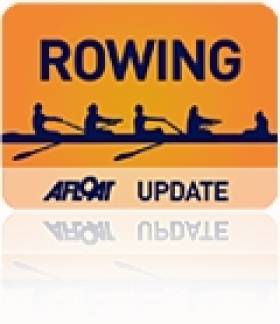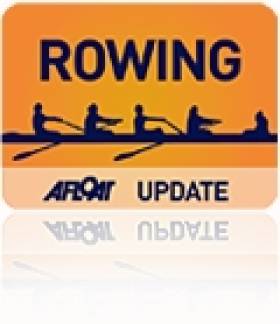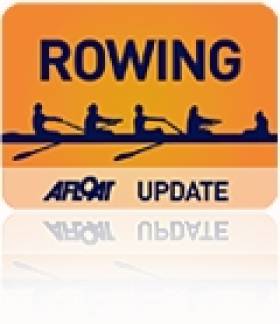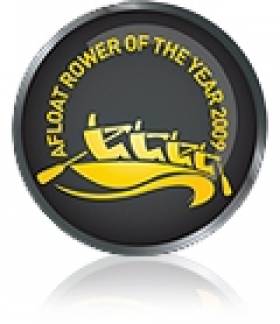Displaying items by tag: Niall Kenny
Good Placing for Ireland Internationals in London Fours Head
#Rowing: A quadruple featuring three Ireland lightweight internationals finished 15th at the Head of the River Fours in London. Gary O’Donovan, Shane O’Driscoll and Mark O’Donovan joined Niall Kenny in the Tideway Scullers’ crew. They had serious equipment problems which affected their steering from early in the race.
Head of the River Fours, London (Irish interest): 15 Tideway Scullers’ School E 20 52.2
Kenny Bows to Bigger Opponent at Henley Regatta
#Rowing: Niall Kenny lost out in the first round of the Diamond Sculls to a much heavier opponent at Henley Royal Regatta today. Kenny (28) won a silver medal at the World Under-23 Championships in 2010 as part of the Ireland lightweight quadruple, but at 75 kg here he had a disadvantage of 23 kilogrammes against Jonathan Stimpson. The Briton powered into an early lead and won well.
UCD Rowers Win Terrific Gannon Cup Race
#ROWING: UCD won the Gannon Cup for senior men after a terrific struggle, while Trinity senior women took the Corcoran Cup in facile fashion at the Colours Rowing Races on the Liffey today.
Trinity’s crew led the Gannon Cup race from just after the start, but could not gain a clearwater lead. UCD’s pushes were relentless, and though they were still behind coming through the final bridge, Watling Street, they then powered through and had command of the race when Trinity’s number four man and captain, Luke Acheson, collapsed. The race was not rowed out. It took a long time – too long - to get Acheson into an ambulance, as he had to be brought up the river all the way to City Quay before being lifted up the steps. He was being treated in St James’s Hospital this afternoon.
Trinity’s Corcoran Cup crew demonstrated that size is not everything in rowing. They were outsiders, but simply rowed better than UCD. They eked out an early lead and built it steadily into an unassailable margin by the end.
UCD’s annexation of the Sally Moorhead Trophy for novice women was also one-sided, but Trinity took the novice men’s title after UCD suffered a boat-stopping crab right in front of the Four Courts. UCD came back to lead briefly, but Trinity took control again before the finish.
Colours Rowing Races, O’Connell Bridge to St James’s Gate
Men – Senior (Gannon Cup): UCD (M Bailey, W Yeomans, C O’Riada, B Crosse, D O’Neill, A Griffin, P Moore, N Kenny (stroke); cox: L Mulvihill) bt Trinity not rowed out. Novice (Dan Quinn Shield): Trinity bt UCD 1 ½ l.
Women – Senior (Corcoran Cup): Trinity (G Crowe, H O’Neill, H McCarthy, R Deasy, S O’Brien, A Leahy, S Cass, R Morris (stroke); cox: N Williams) bt UCD easily.
Novice (Sally Moorhead Trophy): UCD bt Trinity easily.
Puspure Withdraws From European Rowing Semi-Final
# ROWING: Sanita Puspure was withdrawn from the A/B semi-final of the single sculls at the European Rowing Championships in Seville today. Ireland Performance Director, Morten Espersen said that the decision was made this morning because the 31-year-old had flu-like symptoms. Puspure was very unwell and could not race.
John Keohane finished fifth in his C Final, 17th overall, while the Ireland lightweight double of Niall Kenny and Justin Ryan finished 21st overall with third pace in the D Final behind Slovakia and the Czech Republic. In the C/D semi-final they were competitive early but lost out when the second half of the race became a scramble for second and third places behind dominant winners Hungary. Ireland struggled to deal with the head wind and finished fifth.
European Rowing Championships, Seville, Day Two (Irish interest)
Men
Single Sculls – C Final (places 13 to 18): 1 Hungary 7:56.08; 5 Ireland (J Keohane) 8:03.54.
Lightweight Double Sculls – C/D Semi-Finals Two (First Three to C Final; rest to D Final): 1 Hungary 7:15.12, 2 Slovenia 7:18.43, 3 Bulgaria 7:18.64; 4 Slovakia 7:20.27, 5 Ireland (N Kenny, J Ryan) 7:26.76. D Final (places 19 to 22): 1 Slovakia 7:20.10, 2 Czech Republic 7:20.44, 3 Ireland 7:25.26, 4 Armenia 8:59.40.
Women
Single Sculls – A/B Semi-Final One: Ireland (S Puspure) Did not start.
Kenny Fastest Single Sculler at Neptune Head of River Rowing
# ROWING: The Neptune Head of the River at Blessington gave Niall Kenny and some other top Galway rowers a chance to blow off the cobwebs in the run-up to the National Assessment in two weeks’ time in Newry. Kenny, a lightweight, won the single sculls well with his effort in the better conditions of the second head.
The honour of being the fastest eight was taken with ease by Trinity – St Michael’s damaged the fin on their boat in the first head and did not do as well as they would have liked in a borrowed boat in the second. Trinity were the women’s eight winners and Marie O’Neill of Cork the fastest women’s single sculler.
Neptune Head of the River, Blessington, Saturday (Selected Results)
Men
Eight – Senior: 1 Trinity (head one) 12 minutes 13 seconds, 2 St Michael’s (head 2) 12:24, 3 St Michael’s (head 1) 13:13. Intermediate: Trinity (2) 12:23, 2 Neptune (1) 13:24, 3 Trinity (2) 16:17. Novice: 1 Trinity (2) 13:31, 2 NUIG (2) 13:40, 3 Trinity (1) 13:42. Junior 18: Neptune (2) 12:39, 2 Neptune (1) 13:39, 3 Cork BC (1) 13:41. Junior 16: 1 Portora (1) 13:26, 2 Neptune (2) 14:03, 3 Commercial (2) 14:24. Masters: Old Collegians (1) 14:17.
Four – Senior: 1 St Michael's 12:51, 2 NUIG A/Grainne Mhaol/UCC (head 1) 13:07, 3 NUIG/St Joseph’s (1) 13:08. Intermediate: 1 NUIG B (2) 13:18, 2 NUIG (2) 13:33, 3 Trinity (1) 13:38. Junior 18: 1 Neptune (1) 14:11. Masters: Old Collegians (1) 14:49.
Sculling,
Double – Senior: 1 Trinity (Flaherty, Hughes) (Head 2) 13:57, 2 Commercial (1) 14:11, 3 Graiguenamanagh (2) 15:24. Single: 1 UCC (N Kenny) (2) 14:48, 2 NUIG (Mullarkey) (2) 15:03, 3 NUIG (S O’Connor) (2) 15:23, 4 Commercial (A Maher) (1) 15:26, 5 University of Limerick (Brinn) (1) 15:42, 6 Commercial (Gleeson) (1) 15:50. Intermediate: 1 NUIG (Egan) (2) 15:34, 2 Neptune (O’Connor) (1) 15:35, 3 St Michael’s (Stundon) (1) 15:45.
Women
Eight – Senior: 1 Trinity (2) 14:09, 2 Trinity (1) 14:26, 3 Trinity B (2) 14:26. Intermediate: Trinity (1) 14:36. Novice: 1 Trinity (1) 16:10, 2 Trinity (2) 16:32, 3 Commercial (2) 16:46Junior: 1 Carrick-on-Shannon (2) 15:25, 2 Portora (2) 15:34, 3 Graiguenamanagh (1) 16:10. Junior 16: 1 Portora (1) 15:32, 2 Carlow (2) 17:02, 3 Portora (2) 17:15.
Four – Senior: 1 Cork BC (2) 14:38, 2 St Michael’s (1) 15:30, 3 Commercial (2) 15:30. Intermediate: 1 NUIG (2) 15:58, 2 NUIG (1) 16:53, 3 NUIG B (1) 16:59.
Sculling
Double – Senior: 1 NUIG (1) 15:42, 2 Three Castles (2) 15:43, 3 St Michael’s (2) 16:05.
Single – Senior: 1 Cork (M O’Neill) (1) 16:45, 2 Three Castles (Quinn) (1) 16:53, 3 Trinity (Cooney) (2) 17:00. Intermediate: 1 Trinity (Dolan) (1) 16:53, 2 Trinity (O’Brien) (1) 17:02, 3 NUIG (Hurst) (2) 17:18.
Quadruple Scull Named Rowers of the Year
It was a good year for Irish rowing: among the highlights were an Ireland eight taking bronze at the World University Championships; John Keohane winning the single sculls title at the World Coastal Rowing Championships; Siohan McCrohan and Claire Lambe reaching A Finals at World Cup and European Championship level. At home, NUIG won the senior eights title after another great battle with Queen's. Standing out above the rest, however, is the achievements of the four men who made up the Lightweight Quadruple Scull which took silver at the World Under-23 Championships. Niall Kenny, Michael Maher, Mark O'Donovan and Justin Ryan (pictured below) are the Afloat Rowers of the Year 2010.
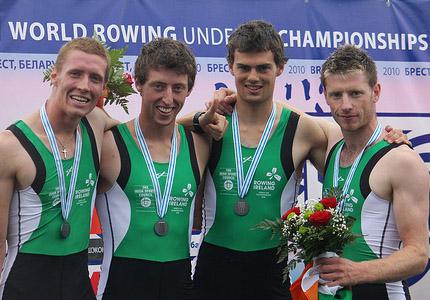
Rower of the Year award: The judging panel is made up of Liam Gorman, rowing correspondent of The Irish Times, President of Rowing Ireland Anthony Dooley and David O'Brien, Editor of Afloat magazine. Monthly awards for achievements during the year have appeared on afloat.ie. The overall national award goes to the person or crew who, in the judges' opinion, achieved the most notable results in, or made the most significant contribution to rowing during 2010. Thanks for your interest!



























